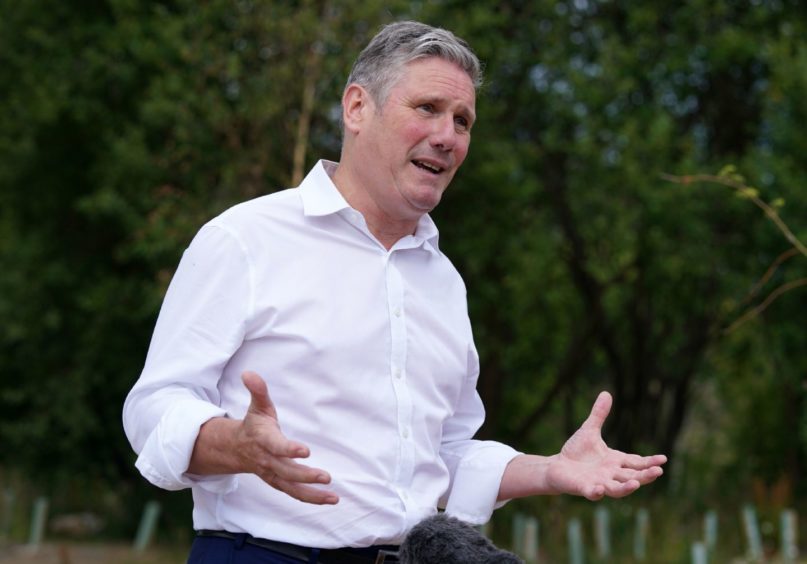
We are now approaching the run-in to a General Election, possibly short and probably long. Either way, we will be heading for the polls later this year, clutching our photo identification.
How much part will energy policy play in the outcome? There are two answers to that. The first is that specific policies and pledges are unlikely to directly swing many votes though Labour will have hopes for its “GB Energy” commitment.
The second answer is more complex. Even if it is not listed as a priority, energy policy is inextricably linked to the big issues which will undoubtedly shape the General Election campaign – the cost of living, job security and environmental responsibility.
Keeping on the right side of these imperatives is essential for any party which is serious about winning in the coming months. Easy applause from pressure groups cannot be bought at the risk of creating electoral millstones.
Under Keir Starmer and Rachel Reeves, the Labour Party has become acutely aware of the need to avoid hostages to fortune. It is therefore a bit odd that, on energy policy, it has offered up two of them, thereby necessitating subsequent readjustments.
Last May the party let it be known that it would ban all new oil and gas developments in the North Sea and bet the house on renewables. It did not take long for the backlash to encourage a refinement of this embryonic policy, making clear that Labour would live with pre-existing commitments if it comes to power.
The problem was more with perception than reality. For workers in the industry, it sounded like a short march to the cliff edge. It’s all very well to promise a just transition but it helps with credibility if, first, there is evidence of something to transition into.
It’s fine to say “we will accelerate the transition and put political muscle and money behind it” but the starting point should not have been to start by talking about banning what exists. That lesson has been learned and acted upon, I think.
Sensing political opportunity
Then Rishi Sunak sensed a political opportunity and headed for the gung-ho extreme with an Oil and Gas Bill which mandates annual North Sea licensing rounds. As the Institute for Government described it, this is “performative politics” which has cost him a decent Minister and will deliver nothing that doesn’t already exist.
Both the “banners” and the “mandaters” brought on themselves political risk by staking out polarised positions which failed the electoral necessity of not causing unnecessary offence to substantial numbers of voters.
The Tories cannot afford to lose their natural supporters who are worried about climate change any more than it made sense for Labour to actively offend the hundreds of thousands whose livelihoods depend on the credibility of the promised transition.
Labour’s other piece of uncharacteristic adventurism was to promise £28 billion a year borrowing to invest in green energy and the industries that could support it. In principle, it is an excellent policy but putting a number on it was the hostage to fortune. Was anyone impressed by such precision?
Inevitably, as the number came under Tory scrutiny, it has been retreated from so instead of getting credit for the commitment, Labour now has to defend itself against charges of retreat. That is unfair because it is the direction of travel that matters and £28 billion a year would be hard to spend anyway. But when was politics fair?
The disappointing truth
The disappointing truth is that over much of energy policy, there is not a lot of difference among the parties, however much they may wish to claim otherwise. This is because they are all working within the same parameters and any government would be buffeted by the same global forces.
For example, however saleable a promise of running down the North Sea might have been a couple of years ago, it is a lot less so now with large parts of the oil and gas-producing world in turmoil. There may be a rational argument against making that connection but try selling it on an Aberdeen doorstep! In fact, don’t bother.
As ever, the three imperatives which any credible energy policy must answer to are security of supply, affordability and environmental responsibility. There may not be many votes to win by quietly accepting the non-negotiable reality of that statement but there are certainly votes to lose by adopting policies which conflict with it.
I mentioned Labour’s promised GB Energy because it does seem an attractive policy that passes the credibility test. Everyone knows the state needs to play a leading role in securing the transition to a cleaner energy future and which cannot be left to market forces or commercial decisions if benefits are to be maximised.
We need more flesh on the bones of what GB Energy would actually do to deliver on high level aims such as “saving £93 billion for UK households” and “creating thousands of good local jobs”. But at least it would be a start to have a powerful agency acting in the public interest, based in Scotland and committed to these outcomes.
A distinguishing political characteristic of energy policy is that for long periods, it may seem unimportant and then, suddenly, it becomes absolutely critical. Any prospective party of government which neglects that risk does so at its peril, particularly in the run-up to an election!
 © Daniel Leal/PA Wire
© Daniel Leal/PA Wire © PA
© PA